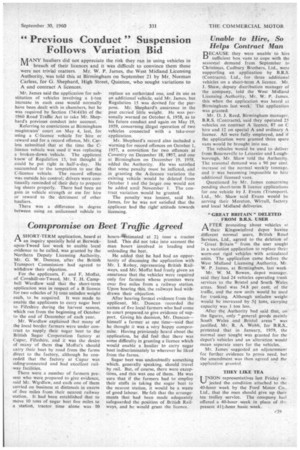Compromise on Beet Traffic Agreed
Page 65

If you've noticed an error in this article please click here to report it so we can fix it.
ASHORT-TERM application, heard at an inquiry specially held at Berwickupon-Tweed last week to enable local evidence to be called, was granted by the Northern Deputy Licensing Authority. Mr. G. W. Duncan, after the British Transport Commission had agreed to withdraw their objection.
For the applicants. F. and F. Moffat, of Cornhill-on-Tweed, Mr. T. H. Campbell Wardlaw said that the short-term application was in respect of a B licence for two vehicles of 34 tons unladen weight each, to be acquired. It was made to enable the applicants to carry sugar beet to Fifeshire during the harvest season, which ran from the beginning of October to the end of December of each year.
Mr. Wardlaw explained that many of the local border farmers were under contract to supply their sugar beet to the British Sugar Corporation factory at Cupar, Fifeshire, and it was the desire of many of them that Moffat's should carry their beet by road from the farms direct to the factory, although he conceded that the factory at Cupar was siding-connected and had excellent rail-way facilities.
There were a number of farmers present who were prepared to give evidence, said Mr. Wqrdlaw, and each one of them carried on business at distances in excess of five miles from their nearest railway station. It had been established that to move 10 tons of sugar beet five miles to a station, tractor time alone was 10
hours–itstimated at 24 tons a tractor load. This did not take into account the man hours involved in loading and unloading the beet.
He added that he had had an opportunity of discussing the application with Mr. 1. Robey, representing British Railways, and Mr. Moffat had freely given an assurance that the vehicles were required only for farmers whose premises were over five miles from a railway station. Upon hearing this, the railways had withdrawn their objection.
After hearing formal evidence from the applicant, Mr. Duncan recorded the names of five local farmers who had come to court prepared to give evidence of support. Giving his decision, Mr. Duncan-himself a farmer at one time—said that he thought it was a very happy compromise: Having previously heard about the application, he did feel that there was some difficulty in granting a licence which would enable a haulier to carry sugar beet indiscriminately to wherever he liked from the farms.
Sugar beet was undoubtedly something which, generally speaking, should travel by rail. But, of course, there were exceptions, and this was one of them. He was sure that if the farmers had to employ their staffs in taking the sugar beet to the nearest station, it would be a waste of good labour. He felt that the arrangements that had been made adequately safeguarded the position of British Railways, and he would grant the licence.
























































































































































































